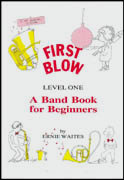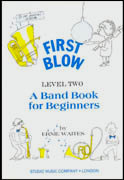We've found 476 matches for your search
Results
-
 £3.95
£3.95FIRST BLOW - Level 1 (Part 3 in B flat BC) - Waites, Ernie
Trombone, Euphonium (for Continental Europe)
Estimated dispatch 7-14 working days
-
 £3.95
£3.95FIRST BLOW - Level 1 (Part 3 in C BC) - Waites, Ernie
Bassoon, Trombone, Euphonium
Estimated dispatch 7-14 working days
-
 £3.95
£3.95FIRST BLOW - Level 1 (Part 4 in B flat BC) - Waites, Ernie
Euphonium, Tuba (for Continental Europe)
Estimated dispatch 7-14 working days
-
 £3.95
£3.95FIRST BLOW - Level 1 (Part 4 in B flat TC) - Waites, Ernie
B flat Bass, Euphonium, Bass Clarinet
Estimated dispatch 7-14 working days
-
 £3.95
£3.95FIRST BLOW - Level 1 (Part 4 in C BC) - Waites, Ernie
Bassoon, Trombone, Euphonium
Estimated dispatch 7-14 working days
-
 £3.95
£3.95FIRST BLOW - Level 2 (Part 3 in B flat - upper octave) - Waites, Ernie
Clarinet, Tenor Saxophone, Baritone, Euphonium
Estimated dispatch 7-14 working days
-
 £3.95
£3.95FIRST BLOW - Level 2 (Part 3 in B flat BC) - Waites, Ernie
Trombone, Euphonium (for Continental Europe)
Estimated dispatch 7-14 working days
-
 £3.95
£3.95FIRST BLOW - Level 2 (Part 3 in C BC) - Waites, Ernie
Bassoon, Trombone, Euphonium
Estimated dispatch 7-14 working days
-
 £3.95
£3.95FIRST BLOW - Level 2 (Part 4 in B flat BC) - Waites, Ernie
Euphonium, Tuba (for Continental Europe)
Estimated dispatch 7-14 working days
-
 £3.95
£3.95FIRST BLOW - Level 2 (Part 4 in B flat TC) - Waites, Ernie
B flat Bass, Euphonium, Bass Clarinet
Estimated dispatch 7-14 working days
